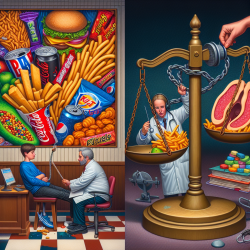Introduction
As practitioners dedicated to improving children's health outcomes, understanding the implications of ultra-processed food (UPF) addiction is crucial. Recent research, such as the study by Gearhardt et al. (2023), provides valuable insights into the social, clinical, and policy implications of UPF addiction. This blog explores how practitioners can leverage these findings to enhance their practice and contribute to better health outcomes for children.
Understanding UPF Addiction
The concept of food addiction, particularly concerning UPFs, has gained traction over the past two decades. UPFs, characterized by high levels of refined carbohydrates and added fats, are consumed in patterns akin to addictive substances. The Yale Food Addiction Scale (YFAS) is a pivotal tool in assessing food addiction, showing a prevalence of 12% in children. This is comparable to addiction levels for substances like alcohol and tobacco in adults.
Clinical Implications for Practitioners
Understanding UPF addiction is vital for practitioners working with children. The presence of UPF addiction is linked to more severe clinical presentations, including higher levels of diet-related diseases and poorer mental health outcomes. Practitioners can utilize this knowledge to:
- Identify children at risk of UPF addiction using tools like the YFAS.
- Implement targeted interventions that address the addictive nature of UPFs.
- Collaborate with nutritionists to develop comprehensive treatment plans.
Encouraging Further Research
While current research provides a foundation, further investigation is needed to fully understand UPF addiction's mechanisms and impacts. Practitioners are encouraged to engage in or support research that explores:
- The interaction of UPF ingredients and their addictive potential.
- The role of UPFs in exacerbating existing health conditions in children.
- Effective clinical guidelines for managing UPF addiction.
Policy Implications and Advocacy
Reclassifying UPFs as addictive substances could lead to significant policy changes, similar to those seen in tobacco regulation. Practitioners can advocate for:
- Stricter regulations on UPF marketing, especially towards children.
- Policies that increase access to minimally processed foods in schools.
- Public health campaigns that educate about the risks of UPF consumption.
Conclusion
Understanding and addressing UPF addiction is crucial for practitioners aiming to improve children's health outcomes. By integrating research findings into practice and advocating for policy changes, practitioners can play a pivotal role in mitigating the impacts of UPF addiction.
To read the original research paper, please follow this link: Social, clinical, and policy implications of ultra-processed food addiction.










